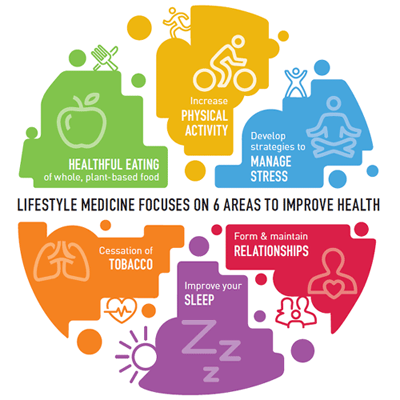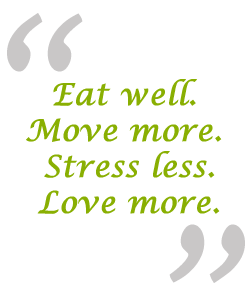 Thomas Fronczak LCSW-R
Thomas Fronczak LCSW-RLifestyle Medicine involves the use of evidence-based lifestyle therapeutic approaches, such as a predominantly whole food, plant-based diet, regular physical activity, adequate sleep, stress management, avoidance of risky substance use, and other non-drug modalities, to prevent, treat, and, oftentimes, reverse the lifestyle-related, chronic disease that's all too prevalent.
These low tech interventions can help promote not just physical but also emotional health and well-being.
For some inspiration click the infographic:

Exercise:
From improving mood by reducing depression and anxiety, maintaining healthy weight and blood sugar regulation, reducing inflammation, maintaining bone density, improving brain health and memory exercise positively impacts both physical and mental and emotional health. Check with your doctor to see if you have any restrictions. Find something that you enjoy to make it sustainable - even walking 30 minutes a day makes a difference.
Stress Management:
Multiple studies in peer reviewed journals show that such practices as yoga and meditation can help improve mood by reducing depressive and anxious feelings thereby increasing the potential for joy. In addition such ancient practices have been shown to positively impact immune function and reduce levels of emotional reactivity by changing the biochemistry of the brain. In other words, what's good for your body is good for your brain health and mood.

Social Support:
The impact of love, connection and intimacy in our lives is signficant. We are social creatures and our brains are designed for social connection. In his book "Love and Survival" Dean Ornish MD reviews the research and informs us that "people who are lonely and depressed are 3-10 times more likely to get sick and die prematurely than those who have a sense of love, connection and community". In other words CONNECTION HEALS.
As Dean Ornish MD says, "Eat well. Move more. Stress less. Love more".

Read this brief summary article about the benefits of lifestyle and eating more plants by Dean Ornish MD.

"Find out what the latest science is saying about your favorite foods to help you make the healthiest choices for you and your family" - Michael Greger MD, FACLM, founder of nutritionfacts.org